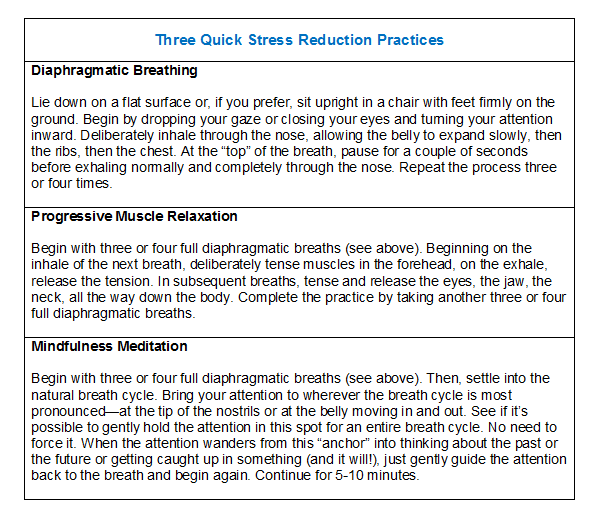How to Stress Less
The statistics about stress are staggering. According the American Psychological Association (APA) in 2017: Nearly eight in 10 people regularly experience physical symptoms caused by stress; almost half say they lie awake at night due to stress; and employers in the U.S. lose nearly $300 billion to stress-related health care and absenteeism.
As coaches, we get to meet clients at critical moments in their lives, where they are likely to be walking a fine line between stress and new levels of success and satisfaction and where they are open to learning new, practical ways of managing their stress.
For that reason, coaches who have a strong understanding of stress—what it is, how it works and how it can be managed—and who are willing to engage with clients in conversation about stress, are poised to increase the impact and efficacy of their coaching engagements.
The Stress Mindset Shift
The dominant cultural refrain about stress is familiar: We are all crazy busy. High stress is inevitable. It’s out of our control. The best we can do is learn a few tips and tricks, cross our fingers, and cope. In early conversation with clients, it’s helpful to listen for language that indicates this, or other unhelpful mindsets around stress, and then to work toward a more empowered mindset.
We might, for example, reframe stress as an early-warning system that indicates a need for increased awareness and increased self-care; both of which can be touched upon in coaching. This is a powerful shift away from the typical default response to stress, which is to double down, speed up and work even harder. This latter response is nice to utilize once or twice a year, but when it becomes the standard operating procedure, it’s a recipe for disaster.
Vulnerability
It can be helpful to remind clients that vulnerability to stressful experience does not spell weakness. It spells being a human being. It means our nervous system (in particular, that pesky limbic brain) is responding just as it should to changes in our environment. This is often a welcome perspective that clients can easily lose sight of in the crush of their day-to-day lives.
The Holmes-Rahe Life Stress Inventory, an assessment tool created by psychiatrists in 1967, lists 43 of the most stressful life experiences. Divorce and separation, getting married, losing a job and retiring are all among the top 10. With this in mind, we might ask our powerful questions of clients that get them thinking about the potential connections between, say, the current difficult period in their marriage and the impatience they have been experiencing with their direct reports.
We might encourage them to explore any given concern in light of what is happening in the rest of their life so that they might discover new ways of caring for themselves and building resiliency.
Awareness
While knowing what makes us vulnerable to stress is useful, it is not enough for people interested in building true resiliency. To become more resilient, it’s necessary to note the signs of stress early, before they become ingrained and problematic.
To do this, clients can take on a simple practice of noticing and charting out when their minds get caught in worrying about the future or troubling over the past. Once they become accustomed to noticing these reflexive habits of mind, it will become easier for them to pause, take a couple of deep breaths and refocus the mind on what’s most important in that moment.
We can design similar practices that train clients to pay attention to difficult emotions or tension in the body, both of which are important to address so that stress does not build up over time.
Deliberate Practice 
For many people, these in-the-moment mindfulness skills don’t come easily and the skill—yes, skill—of relaxing the body seems more challenging than a 16-hour work day. For these reasons, it is important to encourage clients to set aside time practice deliberately.
The initial time investment in deliberate practice can seem daunting for busy clients, but in the long run, most understand that it will make it easier for them to bring their skills into difficult moments and prevent long-term negative impacts of stress from taking hold.
Three tried-and-true practices that help reduce accumulated stress and prevent future stress from accumulating are progressive muscle relaxation, diaphragmatic breathing and mindfulness meditation.
Regardless of coaching niche or target market, all coaches will encounter clients who experience high levels of stress. In addition to applying our usual skills of powerful questioning and deep listening, sharing our knowledge of stress, working with our client’s mindset, increasing awareness and recommending (with permission!) simple practices can have a profound and positive impact on their lives.




Nice writeup Eric. I liked The Holmes-Rahe Life Stress Inventory as an assessment tool .
One question though both the title “How to Stress Less” and the content implies to me that there is a limiting belief – “Stress is part and parcel of modern day life” and we can only reduce but not eliminate – Is that the purport?
Where I come from when we get a disease like Diabetes, while addressing or even disease-management is the first logical step to bring it under control, there are two other steps too, namely, root-cause analysis and disease-reversal and elimination. Both of these are plausible in stress-elimination too?
After all we need to manage things that are precious to us (like finance?) not unwanted elements in our life like “stress” with stress-management – Agree?
Thanks for highligting this topic
Best Mani
Thanks, Eric – Glad you’re writing on this and appreciate your blog!
I hope we bring more of these practices into wellness ‘being’ leadership styles in the work place. With 70 hour work weeks full of travel and doing more with less, time, we need the space and expectation that people will integrate this into into work life on company time. Leaders will have to set the example.
I suspect this one be popular…but if we can have prayer rooms and gyms and walking trails available at work, then adding time to breathe, mediate and elevate this mindset can be embraced. There’s really nothing stopping us but mindset.
As coaches, we have the opportunity to help clients manage stress and improve their lives. By shifting their mindset, acknowledging vulnerability, and increasing awareness, we can help them build resilience. Deliberate practice of stress reduction techniques like progressive muscle relaxation, diaphragmatic breathing, and mindfulness meditation can also make a significant difference. It’s important to remind clients that stress is normal and to encourage them to explore the connections between different stressors in their lives. By sharing our knowledge and utilizing powerful questioning, we can help clients find new ways to care for themselves and prevent long-term negative impacts of stress.